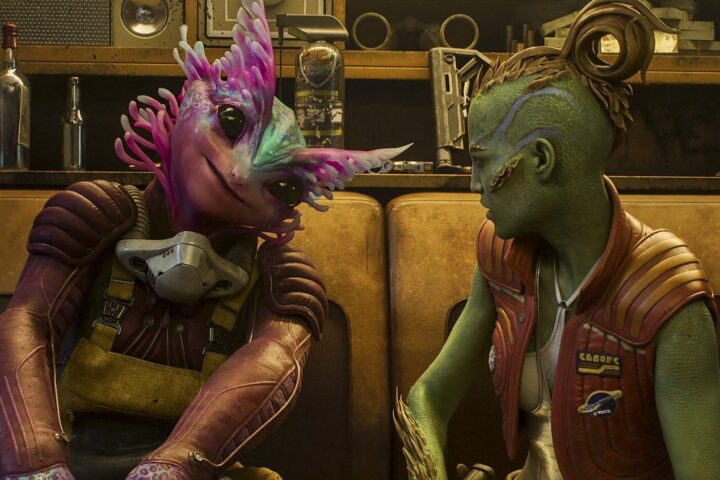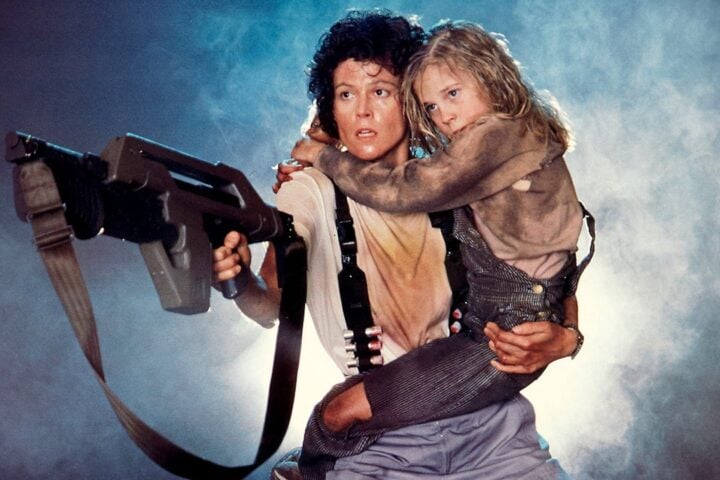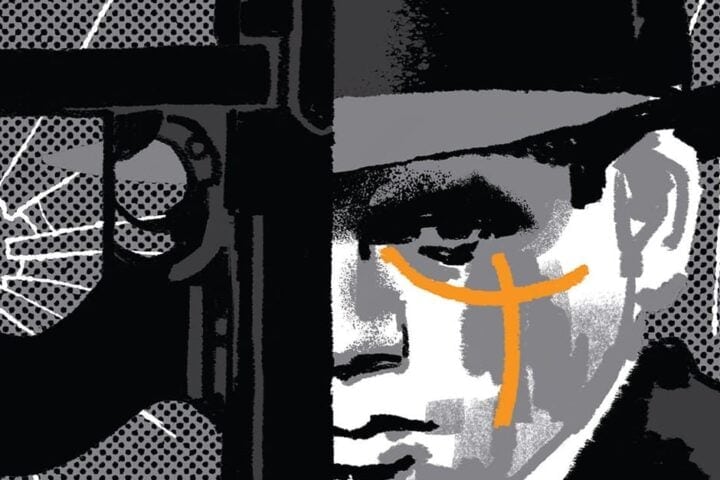Is it only incidental that James Cameron’s greatest film clocks in at under two hours? His subsequent films have proven consistently entertaining and frequently excellent, but the lightning of his sophomore feature—a content-to-be-small B movie that nevertheless feels epic in scope and emotion—has yet to strike twice. The Terminator remains as intelligent and emotionally complex as any film of its kind (among sci-fi action noir, only Blade Runner is superior), and the reductive lens of pop culture—to say nothing of intellectual film snobs ignorant to genre pleasures—can’t extinguish its mythic humanist power.
Cameron’s influences include all manner of science fiction, from 2001: A Space Odyssey to Ray Bradbury to Star Wars, but the film’s true creative counterpart might be Mary Shelley’s Frankenstein. Religious if not outright spiritual, The Terminator is, at its core, a meditation on mankind’s thirst for progress and the likely fallout that results from a lack of self-regulation, extinction being the ultimate punishment for the sin of creation without moral consideration.
As in its thematic successor, The Matrix, the man-versus-machine dynamic might be too outwardly dramatic to be truly prescient (in reality, we’ll probably get something closer to a WALL-E/Road Warrior dystopia when the shit hits the fan), but the film’s pulpy tech-noir trappings reach a modestly operatic intensity that more than justifies the metaphorical frankness of the proceedings. The Terminator’s understated, workmanlike artistry suggests both the quotidian and the extraordinary, particularly when paired with the robotic emotion of Brad Fiedel’s synth score. It erupts in your consciousness and takes flight like a dream.
The film’s primary antagonist, the supercomputer SkyNet, is essentially a reworked HAL-9000, an amoral technological entity bent on self-preservation. After achieving self-awareness and waging war against humankind throughout the early decades of the 21st century, SkyNet and its fleet of robotic warriors eventually fall, but not without a fight: Using a limited means of time travel, SkyNet sends one infiltration unit, a Terminator (Arnold Schwarzenegger, perfectly cast as the flesh-covered cyborg), back in time to kill Sarah Connor (Linda Hamilton), the eventual mother of the eventual leader of the human resistance, John Connor. In response, the resistance sends one of its soldiers, Kyle Reese (Michael Biehn), back in time to protect Sarah.
Those who know the film know how paradoxically savory this plotline becomes, with what David Foster Wallace referred to as the film’s “Appointment-in-Samarra” twist. One wonders whether Cameron was deliberately calling attention to the religious undercurrents of his story by granting John Connor the same initials as another, altogether more popular savior, or if it was simply a creative example of Something Meant to Be. From across the chasm of time, the adult John Connor and SkyNet aren’t unlike opposing forces engaging in a Faustian wager, while Kyle’s fathering of John ultimately suggests something not unlike a divine birth.
The Terminator is surprisingly meditative, its visceral bursts of action not unlike punctuation marks to its more brooding stretches. This is particularly true of the first half hour, in which the pieces of the plot are carefully arranged before the tipping of the first domino. Though beginning with and sporadically returning to visions of Kyle’s post-apocalypse Los Angeles, in which aerial Hunter-Killers and tanks the size of buildings scout for humans amid the skull-infested, burned-out wasteland, things are left relatively unexplained until after the titans have first clashed, and part of the film’s thrill is learning how the pieces fit together as bullets fly and rubber screeches on the asphalt. The only breathers are those enjoyed by the protagonists, which, given the Terminator’s persistence and chameleonesque ability to disguise itself—as a police officer and, in the film’s most chilling scene, Sarah’s mother—are few and far between.
Guerilla filmmaking with a newcomer’s edge has rarely been put to better use. Strengths that point the way to Cameron’s later work are on display here, but even his relative weaknesses, and some unavoidable technical ones, prove beneficial to this film’s grungy edge. On-the-nose dialogue suggests real people losing it amid unimaginable stress, while even the most dated effects effectively and creepily reinforce the non-humanness of the Terminator. Even Schwarzenegger’s performance can be called something of a special effect: A perfect body and an eerily off-base voice suggest a slightly imperfect interpretation/recreation of a human. Terminator 2: Judgment Day’s special effects are deserving of their landmark status, but forgive this fan of the old school for preferring miniatures, rear-screen projection, and crumpled tinfoil (the last image of the crushed Terminator) to even the most tastefully rendered CGI.
It’s not hard to see why the film has proven so enduring, as it’s one of the most hopeful films ever made. Knowing what she does of the future, Sarah driving off into the coming storm in the film’s final shot is a profound acceptance of unimaginable responsibility, but the film argues further that every life is meaningful in the final equation. Even on the eve of self-destruction, mankind is still worth saving, and the most complex machine can yet fall to the simplest.
Image/Sound
The controversial remastering process used to prepare the recent spate of 4K releases for James Cameron’s back catalog has resulted in transfers ranging from the sublime (Titanic) to the ridiculous (True Lies). Happily, The Terminator’s transfer not only belongs in the former category but may be the best of the remasters to date. Far from overcorrecting the original image, the remaster accurately renders the occasional softness of exterior night shots or bit of visible makeup on Arnold Schwarzenegger’s increasingly damaged face while nonetheless bringing new depth to black levels and stabilizing contrast between nighttime skies, the lead characters’ exhausted, pale complexions, and the odd streak of 1980s neon blues and purples.
A new Dolby Atmos mix distributes the soundtrack across multiple channels to further call attention to Cameron’s expert use of plodding sound effects, as well as the metronomic clang of Brad Fiedel’s synth-heavy score to maintain tension at all times. Dialogue remains clear no matter how loud the music or a burst of gunfire or explosives gets.
Extras
Warner Bros. Home Entertainment’s disc ports over select extras from various DVD and Blu-ray releases of years past, chiefly a trio of featurettes on specific aspects of the film like its visual effects and legacy. There are also a few deleted scenes, most of which last less than a minute, with optional commentary from Cameron explaining why they were cut.
Overall
Boasting a best-yet Park Road Post remaster and a wonderful new Atmos mix, James Cameron’s breakout film gets a 4K UHD release whose only bummer is the inclusion of scant prior extras.
Since 2001, we've brought you uncompromising, candid takes on the world of film, music, television, video games, theater, and more. Independently owned and operated publications like Slant have been hit hard in recent years, but we’re committed to keeping our content free and accessible—meaning no paywalls or fees.
If you like what we do, please consider subscribing to our Patreon or making a donation.






The film was released in 1984. Not 1987.
Great review!